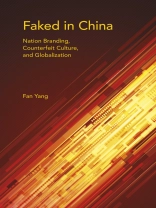Faked in China is a critical account of the cultural challenge faced by China following its accession to the World Trade Organization in 2001. It traces the interactions between nation branding and counterfeit culture, two manifestations of the globalizing Intellectual Property Rights (IPR) regime that give rise to competing visions for the nation. Nation branding is a state-sanctioned policy, captured by the slogan ‘From Made in China to Created in China, ‘ which aims to transform China from a manufacturer of foreign goods into a nation that creates its own IPR-eligible brands. Counterfeit culture is the transnational making, selling, and buying of unauthorized products. This cultural dilemma of the postsocialist state demonstrates the unequal relations of power that persist in contemporary globalization.
Table of Content
Acknowledgments
List of Frequently Used Translations and Transliterations
List of Abbreviations
Introduction
1. ‘From Made in China to Created in China’: Nation Branding and the Global-National Imaginary
2. From Bandit Cell Phones to Branding the Nation: Three Moments of Shanzhai
3. Crazy Stone, National Cinema, and Counterfeit (Film) Culture
4. Landmark, Trademark, and Intellectual Property at Beijing’s Silk Street Market
Conclusion: Cultural Imperialism and the ‘Chinese Dream’
Appendix 1. Crazy Stone Synopsis
Appendix 2. The Opening (Copied) Sequence in Crazy Stone
Appendix 3. Silk Alley Synopsis
Notes
Bibliography
Index
About the author
Fan Yang is Assistant Professor in the Department of Media and Communication Studies at the University of Maryland, Baltimore County.












